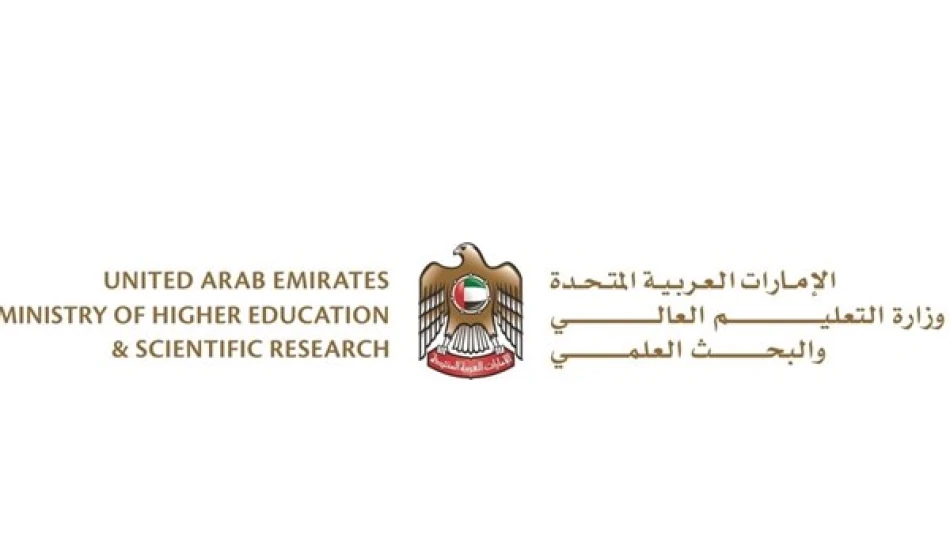
Higher Education Ministry Unveils Revamped University Academic Evaluation Framework for 2025-2026
UAE Overhauls University Calendar: Strategic Move to Boost Student Performance and Family Cohesion
The UAE Ministry of Higher Education has announced a comprehensive restructuring of the academic calendar for all universities, starting from the 2025-2026 academic year. This unified approach aligns university breaks with school holidays and introduces a more balanced distribution of study and rest periods, reflecting the nation's commitment to enhancing educational outcomes while strengthening family bonds during the "Year of Community" initiative.
A Calculated Response to Educational Burnout
The new academic structure represents more than administrative convenience—it's a strategic intervention addressing student mental health and academic performance. By extending winter break to four weeks (December 8, 2025 to January 4, 2026) and maintaining a two-week spring break (March 16-29, 2026), the UAE is acknowledging what educational research has long supported: well-timed breaks improve cognitive retention and reduce academic stress.
Dr. Abdulrahman Al Awar, Minister of Human Resources and Emiratisation and Acting Minister of Higher Education, emphasized that this restructuring aims to create "a more integrated educational environment" that responds to both student and family needs while supporting "mental and psychological stability."
Regional Leadership in Educational Innovation
Setting New Standards in the Gulf
This move positions the UAE ahead of regional competitors in educational reform. While Saudi Arabia has focused heavily on university expansion through its Vision 2030, and Qatar has concentrated on attracting international branch campuses, the UAE is pioneering student-centric calendar design that could influence broader Gulf educational policy.
The decision to synchronize university and school holidays addresses a practical challenge many Gulf families face: managing different academic schedules across educational levels. This coordination could enhance the UAE's appeal to expatriate families choosing between regional education hubs.
International Flexibility Maintained
Crucially, the new system accommodates international universities operating in the UAE, allowing them to maintain alignment with their home institution calendars. This flexibility protects the UAE's position as a regional education hub while ensuring local institutions benefit from the standardized approach.
Market and Investment Implications
For education investors and private university operators, this standardization offers both opportunities and challenges. The unified calendar could reduce operational complexity and marketing costs, as institutions no longer need to compete on break schedules. However, it also limits differentiation strategies that some private universities might have used to attract students.
The emphasis on student well-being and family cohesion aligns with growing global trends toward holistic education models, potentially making UAE universities more attractive to international students whose families prioritize work-life balance.
Implementation Strategy and Flexibility
The ministry has built pragmatic flexibility into the new system, allowing up to one week of adjustment before or after designated break periods to accommodate specific program requirements. This approach demonstrates sophisticated policy design that balances standardization with institutional autonomy.
The academic year will run from August 25, 2025, to July 3, 2026, providing a clear framework while maintaining space for summer programs and intensive courses that many universities use to differentiate their offerings.
Long-term Strategic Vision
This calendar restructuring reflects the UAE's broader educational strategy of creating "qualified competencies with tools of excellence and creativity." By prioritizing student mental health and family integration, the UAE is positioning its higher education system as a model for sustainable academic achievement rather than purely competitive pressure.
The initiative also supports the UAE's knowledge economy goals by potentially improving graduation rates and student satisfaction—metrics that directly impact the country's human capital development and economic diversification objectives.
As regional education competition intensifies, the UAE's focus on student-centric policy design rather than just institutional expansion could prove decisive in attracting and retaining top talent in the increasingly important Gulf education market.
Most Viewed News

 Layla Al Mansoori
Layla Al Mansoori






